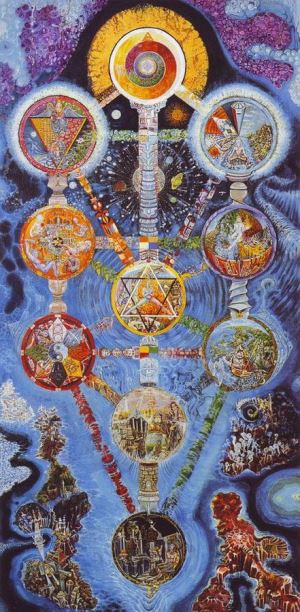THEOLOGY & APOLOGETICS
Kabbalah and Messianic Judaism
By Rabbi Robert
Most of Kabbalah came from Medieval Judaism. Though the claim is that the practice of Kabbalah comes from the Patriarchs, the true practice of Kabbalah is based on the writings of the Zohar. It is believed that the Zohar was written, mostly in an eccentric style of Aramaic in the second century, by Shimon bar Yochai and published by a Jewish writer Moses de Leon in the 13th century. It is taught that the Zohar is the concealed part of the Oral Law and is categorized with the Pseudepigraphy and Apocrypha so it not part of the canon of Scripture or true practice of the Bible. The mysticism called Kabbalah is taught to have a higher, more spiritual, esoteric or divine component. But on the face of it, Kabbalah is the practice of sorcery and consulting of mediums, and even a type of witchcraft since there are incantations and rituals.
The claim that Kabbalah came from the Oral Law is not universally accepted. The Talmud actually forbade the public teaching of esoteric doctrines and warned of their danger. Legend states that foreign conquests of Israel drove the Jewish spiritual leadership of the time (the Sanhedrin, Second Temple era) to hide the knowledge and make it secret, fearing that it might be misused if it fell into the wrong hands. The Sanhedrin leaders were also concerned that the practice of Kabbalah by Jews of the Jewish diaspora, unsupervised and unguided by the masters, might lead them into wrong practice and forbidden ways. As a result, the Kabbalah became secretive, forbidden and esoteric to Judaism for two and a half millennia.
According to the Zohar, a foundational text for kabbalistic thought, Torah study can proceed along four levels of interpretation.
• Peshat (lit. "simple"): the direct interpretations of meaning.
• Remez (lit. "hint[s]"): the allegoric meaning.
• Derash (from Heb. darash: "inquire" or "seek"): midrashic (Rabbinic) meanings, often with imaginative comparisons with similar words or verses.
• Sod (lit. "secret" or "mystery"): the inner, esoteric (metaphysical) meanings, expressed in kabbalah.
With the national trauma of the expulsion of the Jews from Spain in 1492, Jews began to search for signs of when the long-awaited Jewish Messiah would come to comfort them in their painful exiles. In the 1500s the community of Safed in the Galilee became the center of Jewish mystical, exegetical, legal and liturgical developments. The Safed mystics responded to the Spanish expulsion by turning Kabbalistic doctrine and practice towards a messianic focus. This might be why some think that there is such a thing as Messianic Kabbalah.
Kabbalah became mainstream in many Hasidic sects (Ultra-Orthodox) of Judaism because of the influence of Isaac Luria (1534-1572), who is the father of modern Kabbalah, whose teachings were carried on by Rabbi Hayyim ben Vital. Luria's teaching started many false teachings and heresy such as the Sabbatean mystical heresy.
Moses Cordovero and his school popularized the teachings of the Zohar which had until then been only a restricted work. The author of the Shulkhan Arukh (the normative Jewish "Code of Law"), Rabbi Yosef Karo (1488–1575), was also a scholar of Kabbalah who kept a personal mystical diary.
Some would state that Kabbalah is a part of mainstream Judaism or Messianic Judaism, but there is no basis of fact in their assertion. Regardless of how Kabbalah started, there is no room for Kabbalah or other mystical or esoteric teachings in true faith in Messiah Jesus. I caution against the study of Kabbalah or other mystical practices as supported by the Holy Scriptures in Leviticus 19 and 20. Many people, seeking to be seen as ultra-spiritual, will study and practice Kabbalah. One celebrity who studies Kabbalah is Madonna. But much like Scientology, Kabbalah is a false religion.
Image Credit: Rodrigotebani; "Albero della Vita di Davide Tonato"; Public Domain
Tags: Biblical-Truth | Controversial-Issues | False-Teaching | History-Apologetics | Other-Religions
comments powered by Disqus
Published 11-12-14

